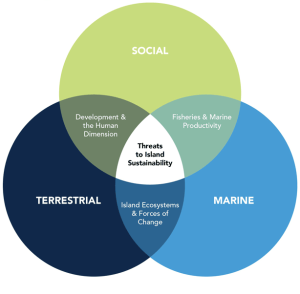About Us
Since Charles Darwin reached the shores of the Galapagos archipelago in 1835, 600 miles off Ecuador’s coast, the islands’ unique ecosystems have been a living laboratory. Buffeted by rising ocean temperatures, extreme weather events, a rise in ocean levels, climate change, increasing tourism, burgeoning resident populations, and invasive species, these iconic islands represent the world’s greatest vulnerability and also its greatest opportunity. Due to their isolation, fragility, and one-of-a-kind organisms, this World Heritage Site acts as an early warning system to recognize the threats to island ecosystems globally. Saving the Galapagos Islands requires a dedicated and innovative strategy that is transformative, interdisciplinary, and sustained. Today, lessons learned by scientists and scholars working in the islands can translate into saving fragile ecosystems around the globe. In 2007 the United Nations designated the Galapagos Islands “at risk” from the threats associated with population growth and economic development. The Center for Galapagos Studies addresses these complex interactions among social, terrestrial, and marine environments through an integrated perspective that emphasizes coupled human and natural systems. UNC Chapel Hill’s research in the Galapagos is interdisciplinary and aims at identifying the proper balance between the natural environment and the people who live in and visit these special places. The goal is that our work in the Galapagos will be a model for understanding similarly challenged environments around the world. Built on Darwin’s foundations, the University of North Carolina at Chapel Hill, USA and the Universidad San Francisco de Quito (USFQ), Ecuador formed a strategic partnership in 2006 to address the challenges facing the Galapagos Islands. The Galapagos Initiative is committed to conducting interdisciplinary research, experiential education, and community outreach programs with the larger goals of advancing conservation efforts in the Galapagos and promoting better understanding of ecologically sensitive and protected areas worldwide. In 2011 this strategic partnership was further solidified through the construction of the Galapagos Science Center (GSC) – the only institution of its kind in the Galapagos archipelago. The GSC’s faculty, students, and staff examine the complex interplay among social, terrestrial, and marine sub-systems with a focus on: The GSC represents a major commitment by the University to put its research strengths into action in order to preserve the Galapagos and the beloved species that live there and to enable the people of the Galapagos and the world to experience and sustain this unique ecosystem. The Center for Galapagos Studies (CGS) is UNC Chapel Hill’s managing unit for the Galapagos Initiative. The Center coordinates Galapagos programs at the main Chapel Hill campus and all UNC activities in the Galapagos archipelago itself. It also serves as the primary communication link with USFQ. The Center also administrates the joint UNC/USFQ Galapagos Science Center and coordinates research, teaching, and outreach activities in Chapel Hill with the GSC. CGS partners with many local, national, and international organizations and institutions. The Center also maintains relations with local governments, NGOs, and other conservation and science organizations operating in the Galapagos archipelago. Our Mission Statement: UNC Galapagos: One location. Universal Connection.
Why the Galapagos Islands?
Creation of the Galapagos Initiative
UNC Center for Galapagos Studies

